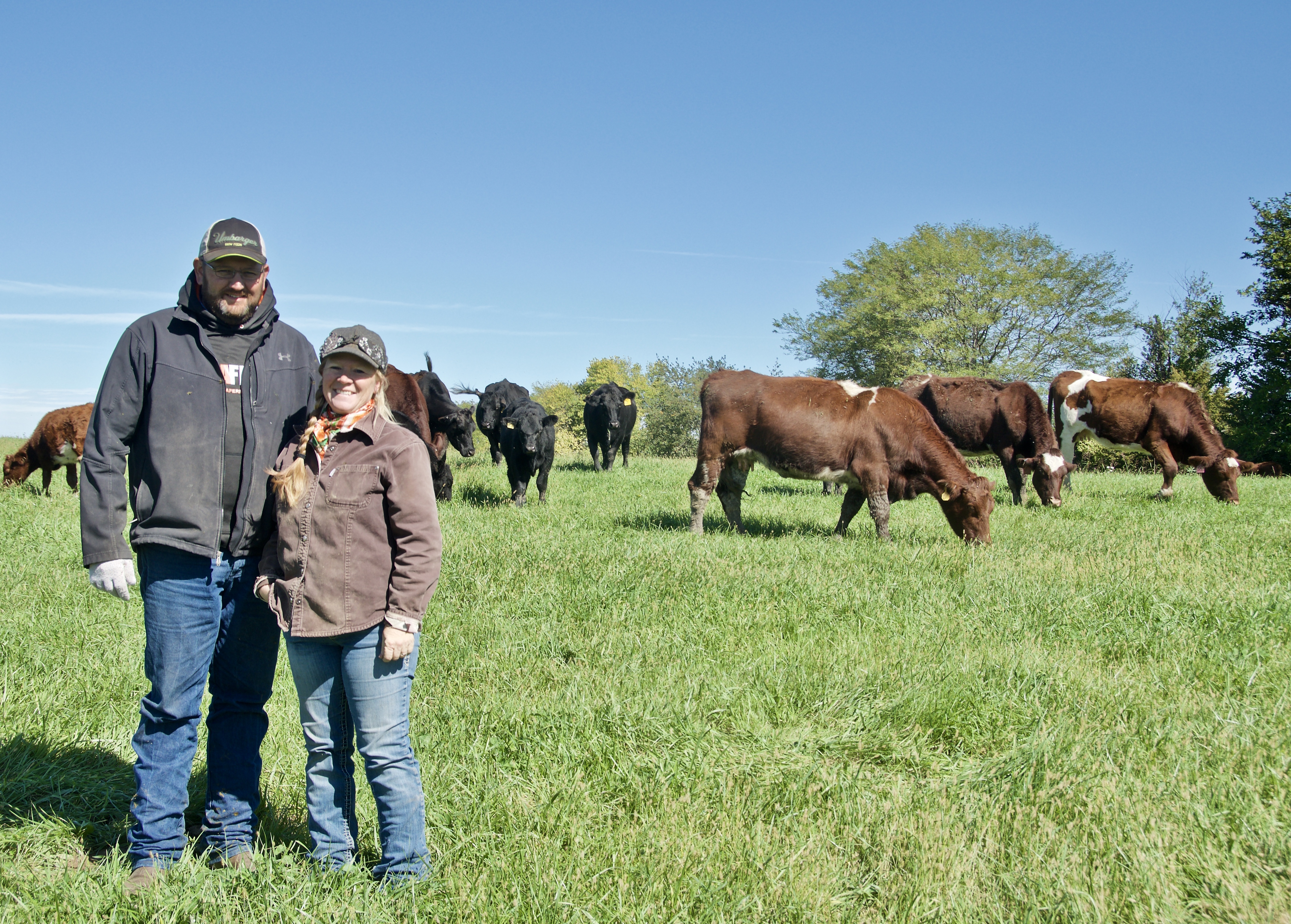
Diversifying to Achieve the Dream
Shanen and Beau Ebersole have walked down many paths to get to their Kellerton, Iowa, ranch where they raise kids, cattle and horses. Not one of them has been direct. Shanen (’98 animal science) and Beau (’98 ag studies) met at Iowa State. They both have worked at different cattle operations and in different jobs, but their dream has always been to have their own operation and raise their family on a cattle ranch.
Their secret to building their own ranch? Creativity and open-mindedness says Shanen. The Ebersoles raise Maine-Anjou cattle, which they love for their mothering instincts, docility and the quality meat they produce. While they’ve been involved in the Maine-Anjou business for most of their marriage, they’ve been able to grow their own herd while taking care of other people’s cattle.
Cows owned by other farmers have helped them use the grass on their ranch and on rented acres. This part of their business started by taking care of small groups of cows and grew to as many as 700 cows at one time. This year they are caring for 400 custom cows.
“Custom cows are generally delivered with calves at side in May and we have them on grass here because their owners don’t have summer pastures. They take them back home in November and turn them out on cornstalk fields for the winter and calve them out and they come back to our grass in the spring,” Shanen says.
With ample pastures available, they are able to keep each owner’s cows grouped and no commingling occurs. Running custom cows has allowed revenue to help build their own herd to 150 head of Maine-Anjou, Maine-Angus, Angus and crossbred cows. Careful planning at breeding time has helped them keep registered cows in the full-blood Maine-Anjou, purebred Maine-Anjou, Maine-Angus and Angus herd books. About 20 to 30 replacement heifers are kept each year and other calves are marketed as breeding bulls, show heifers and fed out as beef. About 11 years ago, the Ebersoles took on a new venture and began selling beef from the animals on their ranch.
“It started as a way to make a farm payment, and built into a lot more. We’ve met some great people and have wonderful customers,” Shanen says.
Their beef has been sold at the Des Moines Farmers Market for eight years, and also is available through the Iowa Food Co-op and by direct sales. All the beef sold by Ebersoles is born and raised at their ranch. They do not use hormones, growth supplements or antibiotics.
“It’s really surprising how much consumers want to know about the beef they are buying for their families,” Shanen says. “All farmers and ranchers have become better at telling their stories and most people understand that we care about how our animals are raised. They want to make the best decisions for their family, just as we do for our family and our animals.
Producers may feed their animals a little differently or have different management techniques, but it is important we stick together to help feed consumers no matter the variations in our operations.”
A good nutrition and mineral program helps the Ebersoles maximize grass in their operation, which includes a detailed year-round rotation. Two years ago, their operation’s path diverted again with the addition of a herd of wild horses.
“It really was an in-depth process that started by hearing an ad on the radio about caring for wild horses from out West,” Shanen says. “We completed a 50-page application that included what types of soil and grasses we had, as well as fencing and water availability. We had to line out an extensive management plan as to how we could make part of our ranch into an area as close to native as possible for these wild horses.”
Becoming an off-range pasture facility for the Wild Horse and Burrow Program through the Bureau of Land Management (BLM) has allowed more diversity on the Ebersole ranch. The area used for the horses was once used in their custom cow rotation. This land had to have an environmental analysis done by the BLM to ensure the land would be a good home for these 350 mares.
“We have regular site visits by the BLM and APHIS (Animal and Plant Health Inspection Service) veterinarians to see how the mares and the land are thriving,” says Shanen. “We are two years into the 10-year contract. It has been a learning curve for us, as horses definitely graze differently than cattle.”
Providing a natural environment for the horses and returning land to the native prairies of old has been satisfying for the Ebersoles. Caring for the animals and the land is important as their children talk about returning to the operation someday.
The couple’s three children, Adelyda, 18; Jolene, 15; and Wyatt, 10; help on the ranch every day. Caring for the cattle and horses on the ranch keep the kids busy, as well as their school activities and showing cattle.
“When I headed off to Iowa State after high school, I sure wouldn’t have guessed this is where I would be now,” says Shanen. “We love our livestock and are glad we have had the opportunity to do what we love.”



